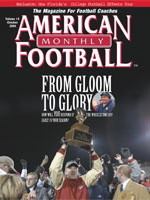AMERICAN FOOTBALL MONTHLY THE #1 RESOURCE FOR FOOTBALL COACHES
Article CategoriesAFM Magazine
|
From Gloom To GloryWhat happens to a team when adversity strikes earlyby: Richard Scott © More from this issue Here’s a warning: like every season, this story starts with a test. You thought you were done with those when you finished college, huh? Well at least it’s a multiple choice test, so you can always make an educated guess. Question 1: When your team slips in September and loses a game or two (or three), you: 1. Call all your coaching connections and start looking for another job. 2. Call your realtor and put the house up for sale. 3. Barricade yourself inside your office and refuse to answer your phone so the boosters and the media can’t get to you. 4. Go back to work, stay upbeat, remain consistent, move forward, focus on fundamentals and direct all your time and energy on improving and p....The full article can only be seen by subscribers. Subscribe today!
|
|
|||||||
| HOME |
MAGAZINE |
SUBSCRIBE | ONLINE COLUMNISTS | COACHING VIDEOS |
Copyright 2026, AmericanFootballMonthly.com
All Rights Reserved





